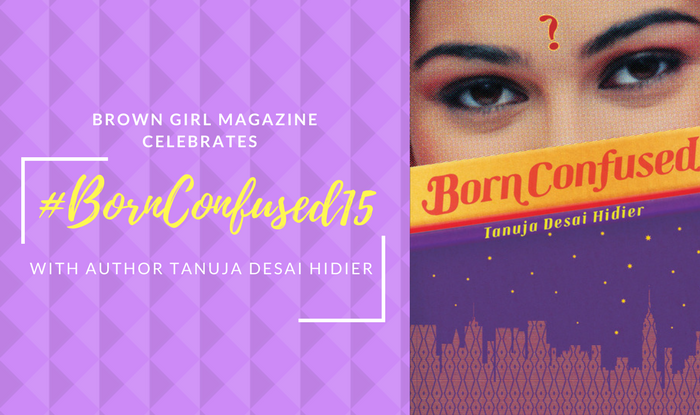
The following post is part of an ongoing series by writers/authors in celebration of the 15th anniversary of the publication of Tanuja Desai Hidier’s landmark novel Born Confused, which is considered to the first ever South Asian American young adult novel (and in part inspired the creation of Brown Girl Magazine!)… as well as the 15th real-time birthday of Born Confused and award-winning sequel Bombay Blues heroine Dimple Lala. #hbdDimple
I first met Tanuja Desai Hidier when she was the lead singer in a band in which my friend was playing electric violin. Afterwards, we got to talking, and as I learned of all of Tanuja’s many creative endeavors, I popped the question I was asking a lot in those days: Have you ever thought of writing a YA novel? I was starting a fiction imprint devoted to bringing new voices to the YA table . . . and I had a hunch that Tanuja’s needed to be at that table.
How right I was. Soon after our conversation, Tanuja sent me a proposal for a novel called ABCD, about a South Asian American girl named Dimple Lala who living in the suburbs of New Jersey and was trying to shape herself out of the collision of the cultures around her. It was unlike anything I’d read before. But I figured that was a sign of my own limitations—surely there had already been a number of contemporary YA novels about South Asian American teens?
Only . . . there hadn’t been. At all.
It’s hard now, fifteen years later, to imagine such a glaring hole in the bookshelves. It’s enraging to think that teens like Dimple Lala could spend their whole adolescence without coming across a character like Dimple Lala. And it’s just as enraging to think of all the kids NOT like Dimple Lala who could spend their whole adolescence without coming across a character like Dimple Lala.
The good news is: Born Confused opened that door. The door has remained open ever since. Plenty of other authors and characters have walked through that door. YA literature and the world are better places because of it. Again, not just for readers who got to see themselves in a book for the first time. But also for people like me, who got to learn much more about the lives of friends and other people around him by getting to know Dimple and her family.
The title for Born Confused came from a misreading of mine—when Tanuja explained the American Born Confused Desi alphabet to me, I read it not as “American Born” but as “American” “Born” and then paired the two middle words together. Tanuja (no doubt amused) ran with it. I had been concerned that ABCD sounded too much like something for little kids, too elementary.
I stand by Born Confused as a title, but with fifteen years’ hindsight, I can see how ABCD would have worked just as well because the book was nothing if not the start of an alphabet that would lead to an abundance of words. This is true for Dimple—she is definitely at the first four letters of her life, and building on from there (as she does so beautifully in Tanuja’s second novel, Bombay Blues). And it is also true for South Asian American YA, which has expanded so vibrantly in the years since.
This is not to relegate the book to historical status. What’s amazing about Born Confused is how it’s just as alive and wondrous now as it was when it was written. Sure, Dimple doesn’t have the opportunity to use Snapchat to mess up her life, nor does she have the luxury of Facebook stalking the boy she likes. The technology and the times have changed. But the emotions? Those are timeless. The exploration and the contemplation? Those are as much a part of the teen experience as a first concert or a first kiss. Born Confused didn’t just break ground—it built something long-lasting on that ground. And it’s still, fifteen years later, one of the greatest joys of my editorial life to have seen it being built.
[su_divider]
 David Levithan is a publisher and editorial director at Scholastic. He also writes novels, including EVERY DAY and TWO BOYS KISSING. You can learn more about him by visiting davidlevithan.com.
David Levithan is a publisher and editorial director at Scholastic. He also writes novels, including EVERY DAY and TWO BOYS KISSING. You can learn more about him by visiting davidlevithan.com.




